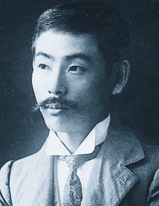Kunikida Doppo
Kunikida Doppo ( Japanese 国 木田 独 歩 , Kyūjitai 國 木田 獨 歩 , actually Kunikida Tetsuo 国 木田 哲夫 ; * July 15, 1871 in Chōshi , Chiba Prefecture ; † June 23, 1908 in Chigasaki ) was a Japanese writer.
Life
Kunikida, born to a court clerk, attended Imamichi Elementary School and Yamaguchi Middle School . In 1889 he began to study English and French at the Tokyo Technical College (now Waseda University ). During this time he was baptized as a Christian. He was de-registered in 1891 because of political activities. He founded the magazine Seinen bungaku (literature for the youth) in 1892 and began teaching English, mathematics and history at the Tsuruya School ( 鶴 谷 学 館 , Tsuruya gakkan ) in Saiki in 1893 . From 1894 he worked as a war correspondent for the Kokumin Shimbun newspaper . His reports were published as a book under the title Aitei Tsūshin after his death .
The following year, Kunikida moved to Tokyo, where he published the magazine Kokumin no Tomo . With Tayama Katai and Matsuoka Kunio he wrote the anthology Jojōshi (lyric poems) in 1897 . Another collection of poems appeared under the title Doppo gin . His lyric work is strongly influenced by William Wordsworth 's natural poetry . Kunikida also published several collections of short stories.
After the Russo-Japanese War , Kunikida worked as a publisher, but two years later he went bankrupt. During this time he turned to the short story .
In 1907 he became infected with tuberculosis, from which he died in 1908.
Kunikida Doppo is one of the most important exponents of Japanese naturalism .
Works (selection)
- Kyūshi ( 窮死 )
The short story describes the miserable working conditions and the death of the earthworker Bunkō in an exemplary and sketchy manner. As a day laborer, Bunkō hardly earns enough money with excavation and excavation work to be able to afford a warm meal. In the evening he went sickly into an inn, aroused the pity of the owner and was given something to eat. He has neither belongings nor a roof over his head for the night. His colleague Benko, who lives with his old father under unreasonable circumstances in a barren and much too small room, takes him in for the night. The indifference of a rickshaw driver leads to an argument the following day, in the course of which Benkō's father suffers a serious accident and dies. Benkō throws Bunkō out of the house so that he can hold the wake. One day later, Bunkō, run over by the train, is found dead on the embankment. The police officer present and the doctor called in lapidarily agree that the deceased, who was already ill, committed suicide. Bunkō ends nameless in a poor grave. The short story ends with the sentence: "Bunkō just couldn't take it any longer." Thematically, Doppo's short story is reminiscent of Gerhart Hauptmann's drama Die Weber . Doppo sketchily describes the hardship and living conditions of a Japanese worker at the turn of the century.
- Text output
- Death from desperation. Translated by Jürgen Berndt. In: Eduard Klopfenstein (Ed.): Dreams from ten nights. Japanese narratives of the 20th century. Theseus Verlag, Munich 1992, ISBN 3-85936-057-4 , pp. 37-45.
- Japanese text edition at Aozora
Other works
- Jojōshi ( 抒情 詩 ), poems
- Musashino ( 武 蔵 野 ), short stories
- Ummei ( 運 命 ), short stories
- Doppo-shū dai-ni ( 独 歩 集 第二 ), short stories
- Nagisa ( 渚 ), short stories
- Take no Kido ( 竹 の 木 戸 ), novel
- Aitei Tsūshin ( 愛 弟 通信 ), reports
Web links
- Kamakura City, Kamakura´s Literary Figures - Biography
- Britannica Online Encyclopedia - Kunikida Doppo
- eNotes - Kunikida Doppo
- Spiritus temporis - Kunikida Doppo
Individual evidence
- ↑ Eduard Klopfenstein (ed.): Dreams from ten nights. Japanese narratives of the 20th century. P. 488.
- ↑ Eduard Klopfenstein (ed.): Dreams from ten nights. Japanese narratives of the 20th century. P. 45
| personal data | |
|---|---|
| SURNAME | Kunikida, Doppo |
| ALTERNATIVE NAMES | 国 木田 独 歩 (Japanese); Kunikida Tetsuo (real name); 國 木田 獨 歩 (Japanese, real name) |
| BRIEF DESCRIPTION | Japanese writer |
| DATE OF BIRTH | July 15, 1871 |
| PLACE OF BIRTH | Chōshi |
| DATE OF DEATH | June 23, 1908 |
| Place of death | Chigasaki |
